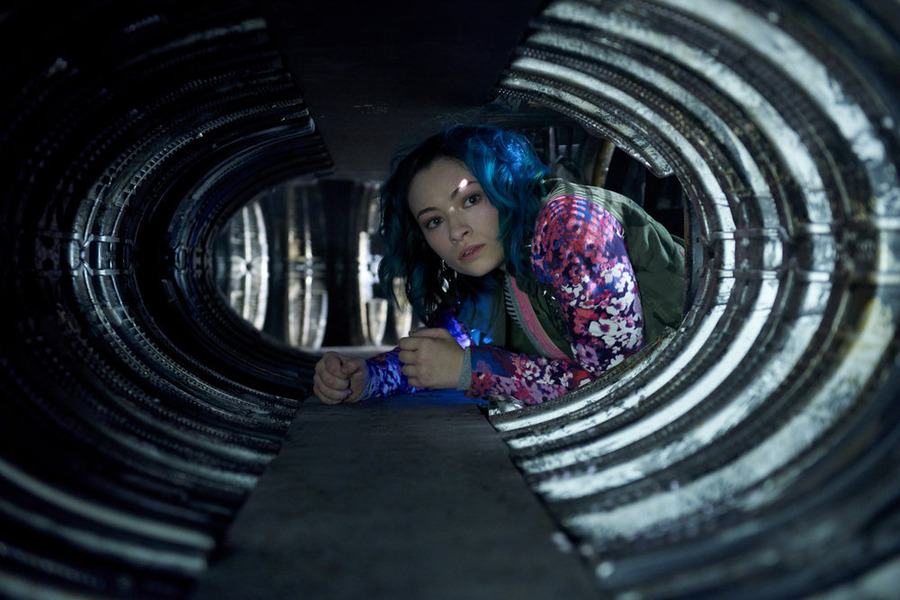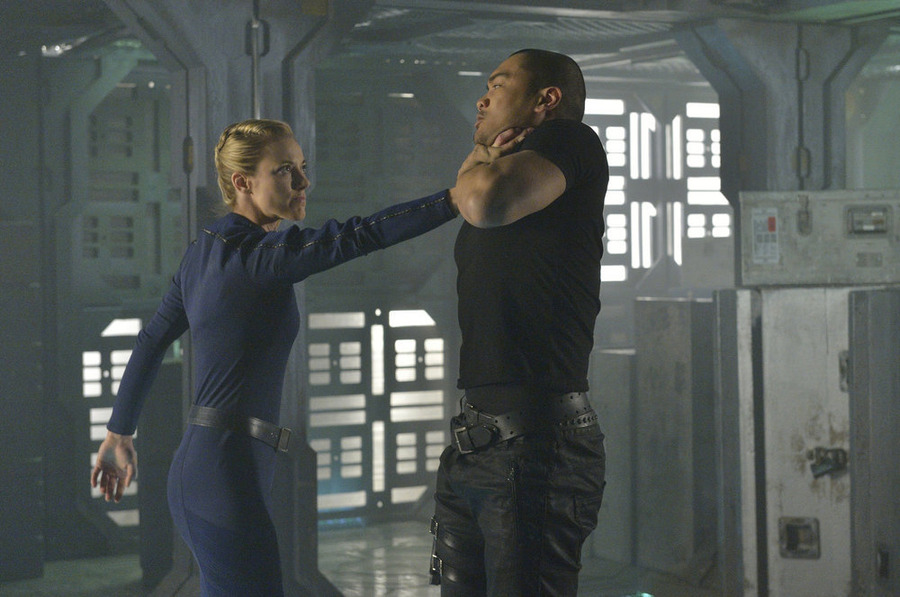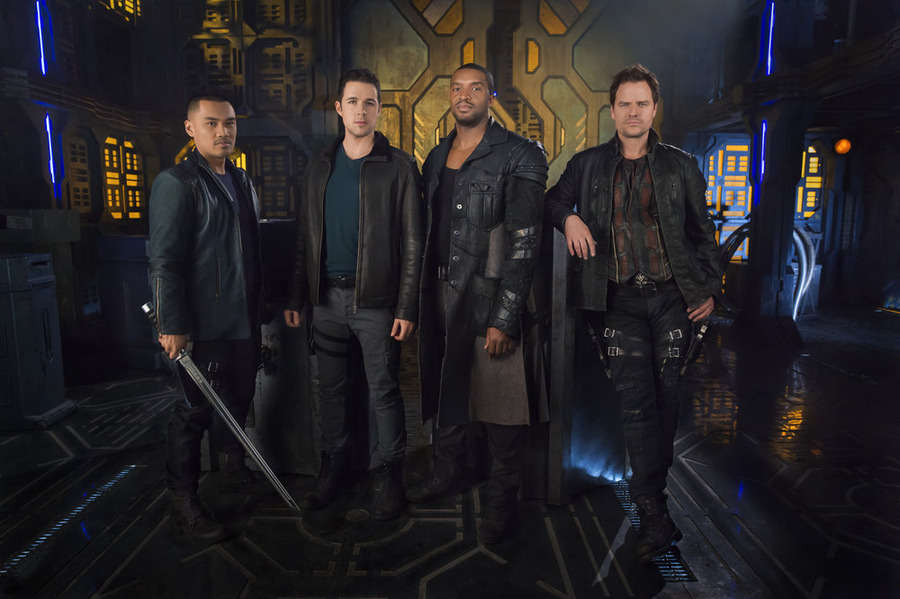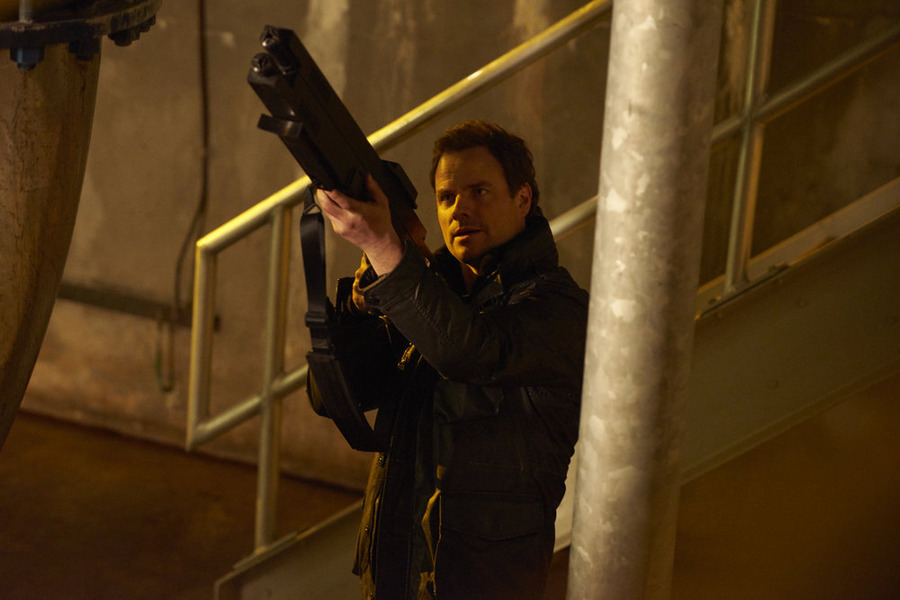
Syfy’s unleashing its newest space drama Dark Matter on June 12th. Judging by the pilot, it’s going to gather an enthusiastic fan base quickly. OHSOGRAY joined a press call with the show’s executive producer Joe Mallozzi and stars Melissa O’Neil, Marc Bendavid, and Anthony Lemke to talk about what viewers can look forward to.
Dark Matter airs Fridays at 10/9c on Syfy.
Melissa, you were kept in the dark about the storylines for your character as the season went along. Did you like that or find it difficult?
Melissa O’Neil: I actually loved it. Being a first-time performer on television, I didn’t really know what to expect, and I – and I thought that it was such a lovely thing to encounter that we were going through what our characters were going through. At the same time, we were discovering what was happening and how to interact with each other in the exact way that our characters would be doing it. We were just piecing it together as it came to us. But, I think that there is a great bit of truth, that’s happening on screen that –we’ve all done our homework to prepare our characters as much as we could. There is honesty that’s happening there as we navigate that.
The cast has great chemistry on screen. Does it feel that way in person, too?
Melissa O’Neil: Thank you. I think that that has a lot to do with Joe and Vanessa and Lisa Parasyn – what they did with casting. We do get along very well – all of us. We have a lot of fun on and off screen, and I think that that has a lot to – the credit goes to the lovely people that chose us. Yes.
“Dark Matter” is based on a graphic novel published by Dark Horse. How much of the content from the graphic novel can we expect to see on the series?
Joseph Mallozzi: You can expect to see all of it. Actually, the comic book was based on, basically, the pilot that we have envisioned. So it’s almost –if you read the first two issues of the comic book, it’s almost, word for word, the first episode of the series. And in episode – the issues three and four of the comic book are very close to episode two. In terms of spoilers, you guys are going to get a sneak peek at episodes one and two by reading the first two issues of the comic book or as in the paperback. But then, after that, all bets are off.
For those who aren’t familiar with the comic book, how would you describe the series?
Joseph Mallozzi: I would describe it as a sci-fi series with a cable sensibility. I’ve always been a big fan of cable shows with twists and turns and surprises that always leave you at the end of the episode going, “Oh my god. I can’t wait until next next week” and you get to the boards, you discuss them or you go to work and it’s the first thing you talk about in the morning. That’s the show I wanted to create. It’s something that a lot of – a lot of setups but a lot of payoffs along the way, you know, the mystery at its heart. It has a sense of humor, kind of a – it’s a fun, ship-based sci-fi which is something, I think, fans have been dying for. But, at the end of the day, it’s really about the characters and this great group made up of this crew. I’ve often said viewers tune in for the hook but they stay for the characters. We’ve got an incredibly colorful bunch of characters in this show.
Melissa O’Neil: Yes. I think that there is – the show – it’s – obviously, it’s – there is no singing in it. But, it has a quality like I want to call it a space opera. Do you know what I mean? There is just so many wonderful things happening and the story lines are fantastic. The fact that we’re an ensemble, you get to see a little snippet of everybody’s past and where they might go. I think that’s really exciting. There is a person for an audience member, you know. There is – there is a character for any kind of audience member out there. It’s great.
Joseph Mallozzi: Yes. One of the – one of the things that I was really heartened by was just getting reactions from people who watched the show for the first time. They all respond to different characters, which is great. The sound guys and the editors all –when they first watched it, they all responded. They love Jodelle’s character. There were those who love Roger’s character, who love Anthony’s character. Those two early reviews, super positive reviews – they were – they loved Melissa’s character. It’s a testament of the fact that there are so many colorful characters, very, different characters, but also a testament to our fantastic cast who have brought them to life.
There are currently several other sci-fi shows debuting this year. What sets Dark Matter apart from the others?
Joseph Mallozzi: Well, it’s – first and foremost, it’s a ship-based sci-fi which, I think, differentiates it from anything else out there. Tonally, it’s a lot of fun. You watch this at the pilot and there’s more of that. At the end of the day, fans like to tune in for the character and just essentially to have a good time. That’s what we’re going to offer them. At the same time, like I said, I’m not sure how serialized the other shows are. But, our show is very serialized in that, I mentioned those twists and turns and surprises. There’s going to be a lot of reward for the audiences who tune in. It’s funny. I was developing this for so many years that we’ve got a great game plan. When Paul and I and my writers sat down and developed the first season, we had all the setups and payoffs. So, I mean, there was this one big revelation, late in the season, I remember, and one of the actors come out and it’s like, “Wait a minute. Was that a hint way back in episode three?” And I was like, “Yes.” So, I mean, it’s kind of fun. It’s the type of show that basically you can – definitely binge-worthy – but also the type of show that when those little payoffs come up along the way, you can go back to those earlier episodes and kind of piece things together. So, I think, like I said, fun – that sense of humor, ship-based and, it’s just, I think very, very binge-worthy.
The characters wake up without memories of their true identities. How do they cope with that?
Joseph Mallozzi: It will different for different characters. I always love this idea that people make mistakes in their past and they can move forward, hopefully, or sometimes not. It’s fun to explore that kind of journey with different characters. And like in real life, it’s not going to be happy ending for everyone. As Melissa said, it’s just very interesting in that, like the audience, these characters essentially start tabula rasa, right? You’re following along on the adventures with them. But, I mean, if you take a look at – in the pilot episode, they – once they fall back, basically they are able to sort of trigger certain aspects of their former self like Melissa’s character to the way she takes command of the ship and the way everyone lets her take command of the ship really speaks to the strength of her character.
Melissa O’Neil: Yes. I think that’s one of the greater struggles that we have with the concept of this show as our characters. It’s that, you know, we wake up and we are who we are in that particular moment. And then, we are confronted with these facts about who we were, and how do we walk through our lives having everybody else who we don’t remember know who we are, know what we are capable of and treat us like that? How do we move forward into that kind of a landscape? It’s very interesting, I think.
What does the title “Dark Matter” refer to?
Joseph Mallozzi: I guess it’s a darkness that resides in all of us.
When you say that this is a ship-based show, does that mean that they aren’t going to be going to various planets very often?
Joseph Mallozzi: No. It’s going to be a little of both. We have an amazing standing set and we’re going to make use of it. As is the case with most of the ship-based shows like “Star Trek” or “Stargate,” or “Firefly,” the ship almost becomes a character in itself, and we have like an amazing, amazing ship. But we’re going to be getting off. We’re going to be visiting planets. We’re going to be visiting space stations. We want to avoid that claustrophobic feel. So, we’ll definitely be opening things up.
Can the actors talk briefly about their characters and kind of what they like about them and what challenges there are in playing them?
Marc Bendavid: I can just in there. My character, One, is really enjoyable to pay, for me at least, because he is surrounded by people who have some kind of quick proficiency at something and he is sort of is always falling on his face like he always makes a mess of himself. You never see any malice or vindictiveness really in him. But, for me, it was fun to be around all these sort of like sexy, lightning-fast action figures and sort of, you know, be the one whose jet pack seems to be broken. Yes. That, for me, was – that, for me, was fun.
Melissa O’Neil: Yes. I – you know what’s interesting? One time, we were doing a cast read-through and we were sitting around the cable room, and I think it was Anthony who remarks that most people who are actors are actually the younger sibling or the only sibling or – sorry – the only child in a family. And as we went through on the table, everyone was either a younger sibling or an only child, except for me. It definitely caters well to who Two is in that she very organically and actually takes on this leadership role that everyone seems to just accept. Yes. She was so much fun. She is – she is direct and straightforward and she gets to kick a lot of ass.
Anthony Lemke: It’s just like Three to show up late to a party. I’ll jump in about Three. He is – if you heard everything about – that Marc said about One, that’s pretty much the opposite of Three. If I could extend the jet pack analogy, I’m the guy with the jet pack that works but doesn’t always know the right thing to do with it. That’s the fun Three’s character, that he is impetuous and he says what other people may or may not be thinking but certainly what he is thinking that he shouldn’t say. It’s a lot of fun to play that kind of character and especially within the context of a crew who –each of us is so well defined. And, so, to be able to play that role within this team is doing a lot of fun.
How did you feel not knowing everything ahead of time and learning along with the characters?
Marc Bendavid: Yes. It might seem sort of contrary to what you often hear actors saying about preparing their role. I found it really liberating and unusual because there’s very little to go on. There’s very little to prepare other than a kind of openness and to what I would react like myself to these people in these situations. So, there is no history. At one point, I asked, “Should I watch every episode of ‘Stargate’ or ‘Star Trek’ ever produced?” And he said, “No.” It seems like to be able to come to work with, in essence, given the other characters and the other actors in the cast a real big say into how one ends up because he is really torn until he encounters Two and until he encounters Three and the rest of the cast. So, I actually – I like it because it meant that we have to be on our toes, listening to each other and just seeing where the scripts took us and making a lot of decisions beforehand. So, for me, I really enjoyed that, actually.
Anthony Lemke: Yes. I think – I think one of the things you learn very early on in your acting career or in – when you’re studying acting is that preparation is key. You should definitely answer all the questions about your character. You should have done all of that homework. When you show up on the first day of shooting, you should forget it all and just play the role and play the reality of the moment because that’s going to be there. In a way, the forget it all part is where we started. And that – just like Marc said, it’s incredibly liberating and we were sort of discovering things about ourselves as characters that – well, I can’t – I mean, listen, we did have a lot of scripts, to be fair. We had a fair number of scripts moving forward. By the first frame of camera, we were able to read, three or four, five, six, seven episodes ahead. At least we knew that as our back-story. “Listen, this is an interesting piece of information that, you know, my character doesn’t have on day one but me as the actor does have.” So, there is – there is a little bit of that forward prep that was – that was in – I think probably influencing our day one shooting decisions as well.
“Dark Matter” begins sort of the way “Stargate Universe” ended. Everyone went into spaceships on “Universe” and then came out on “Dark Matter.” Was that a conscious decision?
Joseph Mallozzi: I started developing “Dark Matter” way back when I was working in Atlanta. So, I have no idea how –we were going to do “Stargate Universe,” much more how we would end it. It was coincidental. But the first person who actually brought it to my attention was actor Patrick Gilmore who played Dale Volker on “Stargate Universe.” He was like, “Wait a minute.” And I was like, “Aha, that is kind of funny” because at the end of “Universe,” of course, everything goes into spaces, while they wait – how long this jump is going to take. That’s how we sadly, ended the series. I guess it’s kind of appropriate in that, I mean, just – you know, there is a definite heavy “Stargate” influence on “Dark Matter,” just the types of shows we used –the type of rating – we used to do it on “Stargate,” relied heavily on the humor. It was very character-driven; a lot of fun. At the end of the day, this really focused on this team, this family. It’s exactly the same thing with “Dark Matter.” So, appropriately enough – but, yes, it works out.


